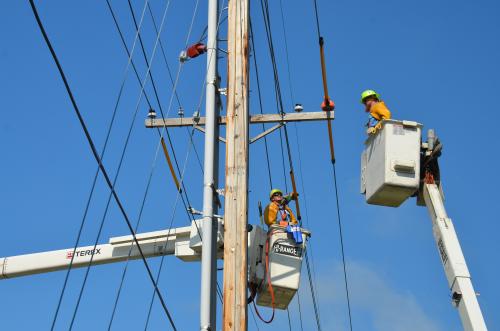This post is the second in a series examining how local leaders across the U.S., including utilities and other community groups, are accelerating efforts toward identifying, hiring, training, and retaining the future water workforce—a segment of the labor force seeing a rise in retirements and struggling to fill jobs, even though these positions offer clear pathways to economic opportunity.
At a time when the country’s water infrastructure is aging and falling into disrepair, many of the workers responsible for constructing, operating, and maintaining these assets are also reaching the end of their careers. Fortunately, water utilities, alongside other local leaders, are jumpstarting efforts to hire and hold onto more workers. With the aim to target hiring and training among a more diverse group of workers locally, Louisville, Ky., provides a timely, relevant example of how all types of markets across the nation are looking to increase awareness and action centered on water workforce development.
Indeed, while Louisville faces several pressing economic and infrastructure difficulties, the urgency of these needs are driving local action and offering lessons for other places to consider across the country. As the 44th largest metro area in the U.S., Louisville boasts a population of nearly 1.3 million people employed across a number of industries, from transportation to healthcare. Yet, even as this medium-sized, Midwestern metro area has seen its economy expand in recent years, it still tends to lag in measures of prosperity and inclusion marked by slow employment and wage growth, particularly among communities of color. Moreover, soaring needs for infrastructure investment in aging pipes, wastewater treatment facilities, and numerous other assets—totaling $4.3 billion in the next 20 years—only adds to Louisville’s built environment challenges.
With these challenges, however, comes opportunity. And Louisville and Jefferson County Metropolitan Sewer District (MSD), the region’s wastewater utility, is working alongside other local leaders to identify, develop, and retain skilled workers from the surrounding community to simultaneously improve infrastructure and promote more inclusive economic development.
The process starts with a clearer vision, including better planning and metrics. Paralleling many of the innovative workforce development efforts already underway among other government agencies and businesses in Louisville, MSD is taking a more comprehensive, long-term view of its workforce needs beyond individual projects, viewing them in light of a broader set of skills and training. As part of its Critical Repair and Reinvestment Plan (CRRP), for instance, MSD is measuring the exact kind of workforce it will need relative to their capital investment plan, while emphasizing continued learning and succession planning among its current workforce. In other words, it’s not just about dumping more financial resources into hiring, training, and retaining more diverse workers, but being more intentional and targeted about where (and when) these efforts take place.
To accomplish its workforce goals, MSD leadership knows they cannot act alone.
To accomplish its workforce goals, MSD leadership knows they cannot act alone. Their response is to work with a variety of local educational, training, and nonprofit groups—paving the way for internship and mentorship opportunities—while collaborating more with other local employers, including suppliers and contractors. For example, beyond identifying younger workers and other nontraditional workers to consider water careers, MSD has sought ways to support more minority and women business enterprises (MBEs and WBEs). In particular, by requiring contractors to hire a percentage of their workforce locally for all construction projects that exceed $5 million in cost, MSD is helping to stretch the net and capture a broader pool of the local labor market.
MSD leadership then joins these local partnerships with a proactive and visible outreach strategy—not just for prospective workers, but also to connect with regional partners and contractors. To build community buy-in, MSD holds an annual outreach session designed to inform and educate the community on upcoming wastewater and water projects and employment opportunities, called “Can You Dig It?” The recent, third iteration of the event brought together hundreds of local contractors, engineers, suppliers, and utility staff to introduce more than $80 million of upcoming projects, while serving as a community-wide meet-and-greet.
This annual, big-tent approach is feeding into a larger outreach and recruitment strategy just launched by MSD: JobLink. Representing a free online tool designed to better connect local workers and employers, JobLink provides a consolidated, easy-to-access platform where new jobs are posted by contractors and resumes are uploaded by individual applicants. Supported by MSD and other community partners, including workforce development agencies, JobLink aims to match local talent with local employment opportunities in the water sector and represents a first-of-its-kind effort nationally.
In this way, MSD and other local leaders in Louisville are expanding the reach of water careers, bridging gaps in infrastructure investment while overcoming long-standing economic divides.
However, hiring, training, and retaining a more diverse local workforce remains a challenging, time-consuming, and ongoing exercise. Education and outreach, in particular, represent key areas of need, where having visible platforms like JobLink are only just beginning to translate clear community benefits to ratepayers, many of whom still view water utilities as service providers and other related employers in a narrow light. At the same time, even as utilities strive to be seen as an “employer of choice” among potential workers, better branding and public outreach are a work in progress. This is especially true given the competition for scarce local talent among many employers in Louisville, from water utilities to energy utilities, transit agencies, and large logistics firms like UPS. In short, local workers with in-demand skills may opt for better pay or opportunities outside the water sector, while local workers without training or experience may simply be left behind.
For these reasons and more, having specific programs to target diverse hires and retain diverse talent is crucial, where MSD (and Louisville more broadly) is on the leading edge of the national curve. But even in Louisville, the work is far from done. Finding ways to translate and replicate these efforts across different regions is an outstanding challenge—and underscores the enormous opportunity to support a more diverse, locally sourced workforce across the country.
Thanks to Annie Rice for research assistance on this post.
The Brookings Institution is committed to quality, independence, and impact.
We are supported by a diverse array of funders. In line with our values and policies, each Brookings publication represents the sole views of its author(s).







Commentary
Looking to hire: Louisville’s efforts to expand and diversify its water workforce
April 3, 2018